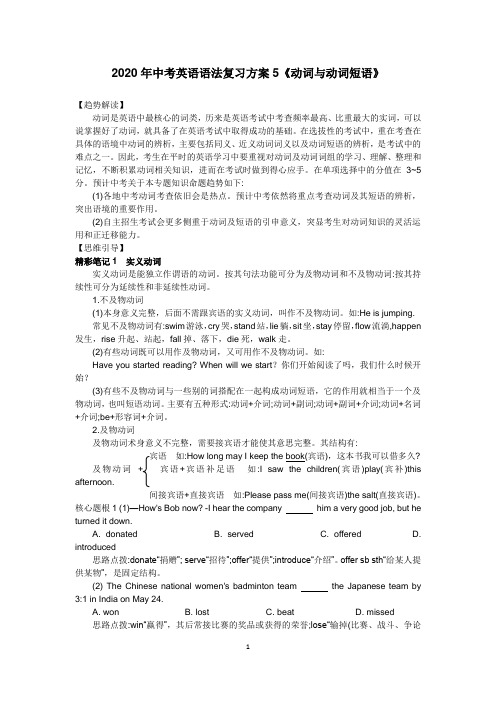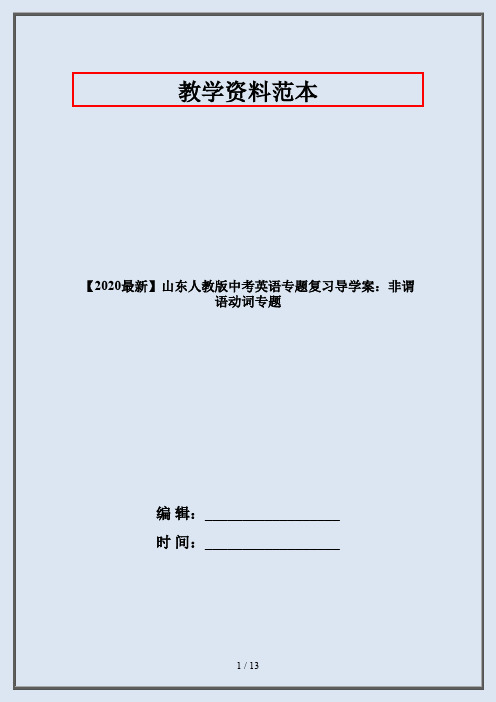山东省2020年中考总复习动词辨析和动词短语学案设计
- 格式:doc
- 大小:85.00 KB
- 文档页数:11

中考英语动词复习教案一、教学目标:1. 知识目标:(1)掌握动词的时态、语态、语气以及非谓语动词的用法。
(2)了解动词短语的常见搭配。
(3)熟练运用情态动词表达可能性、义务和禁止。
2. 能力目标:(1)能正确运用动词的时态、语态、语气和非谓语动词进行句子表达。
(2)能运用动词短语和情态动词完成句子和对话。
3. 情感目标:培养学生的学习兴趣,提高自信心,增强合作意识。
二、教学内容:1. 动词的时态:一般现在时、一般过去时、一般将来时、现在进行时、过去进行时、现在完成时、过去完成时、将来完成时。
2. 动词的语态:被动语态和主动语态。
3. 动词的语气:陈述语气、疑问语气、祈使语气、感叹语气。
4. 非谓语动词:动名词、分词、不定式。
5. 动词短语:常见的动词短语及其搭配。
6. 情态动词:can、may、must、should、will等的情态动词用法。
三、教学重点与难点:1. 重点:动词的时态、语态、语气和非谓语动词的用法。
2. 难点:动词短语的搭配和情态动词的辨析。
四、教学方法:1. 任务型教学法:通过完成任务,让学生在实践中掌握动词的用法。
2. 情境教学法:创设真实的语境,让学生在情境中学习动词。
3. 合作学习法:引导学生分组讨论,相互交流,提高合作能力。
五、教学过程:1. 导入:通过播放一段视频或音频,引导学生关注动词在实际语境中的运用。
2. 呈现:用PPT展示动词的时态、语态、语气和非谓语动词的图片,让学生观察并回答相关问题。
3. 讲解:讲解动词的时态、语态、语气和非谓语动词的用法,举例说明。
4. 练习:设计相关的练习题,让学生进行课堂练习,及时巩固所学知识。
5. 拓展:介绍动词短语的常见搭配,让学生进行实际操作,运用所学知识。
7. 作业布置:布置相关的作业,让学生课后巩固所学知识。
8. 反馈与评价:及时对学生的学习情况进行反馈,鼓励优秀学生,帮助后进生。
六、教学评估1. 课堂参与度:观察学生在课堂上的参与情况,包括发言、讨论、练习等。


2020年中考英语语法复习方案5《动词与动词短语》【趋势解读】动词是英语中最核心的词类,历来是英语考试中考查频率最高、比重最大的实词,可以说掌握好了动词,就具备了在英语考试中取得成功的基础。
在选拔性的考试中,重在考查在具体的语境中动词的辨析,主要包括同义、近义动词词义以及动词短语的辨析,是考试中的难点之一。
因此,考生在平时的英语学习中要重视对动词及动词词组的学习、理解、整理和记忆,不断积累动词相关知识,进而在考试时做到得心应手。
在单项选择中的分值在3~5分。
预计中考关于本专题知识命题趋势如下:(1)各地中考动词考查依旧会是热点。
预计中考依然将重点考查动词及其短语的辨析,突出语境的重要作用。
(2)自主招生考试会更多侧重于动词及短语的引申意义,突显考生对动词知识的灵活运用和正迁移能力。
【思维引导】精彩笔记1 实义动词实义动词是能独立作谓语的动词。
按其句法功能可分为及物动词和不及物动词:按其持续性可分为延续性和非延续性动词。
1.不及物动词(1)本身意义完整,后面不需跟宾语的实义动词,叫作不及物动词。
如:He is jumping.常见不及物动词有:swim游泳,cry哭,stand站,lie躺,sit坐,stay停留,flow流淌,happen 发生,rise升起、站起,fall掉、落下,die死,walk走。
(2)有些动词既可以用作及物动词,又可用作不及物动词。
如:Have you started reading? When will we start?你们开始阅读了吗,我们什么时候开始?(3)有些不及物动词与一些别的词搭配在一起构成动词短语,它的作用就相当于一个及物动词,也叫短语动词。
主要有五种形式:动词+介词;动词+副词;动词+副词+介词;动词+名词+介词;be+形容词+介词。
2.及物动词及物动词术身意义不完整,需要接宾语才能使其意思完整。
其结构有:宾语如:How long may I keep the book(宾语),这本书我可以借多久?及物动词+ 宾语+宾语补足语如:I saw the children(宾语)play(宾补)this afternoon.间接宾语+直接宾语如:Please pass me(间接宾语)the salt(直接宾语)。

中考英语动词复习教案一、教学目标:1. 知识与技能:掌握中考英语考试中常见的动词时态和语态。
学会使用动词短语和情态动词。
能够正确运用动词形式填空、改写句子等。
2. 过程与方法:通过实例分析和练习,提高学生对动词的运用能力。
培养学生通过语境和语法知识来理解和运用动词。
3. 情感态度与价值观:激发学生对英语动词学习的兴趣。
培养学生在实际语境中运用英语动词的能力。
二、教学内容:1. 第一课时:动词的时态过去时(一般过去时、过去进行时、过去完成时)现在时(一般现在时、现在进行时、现在完成时)未来时(一般将来时、将来进行时、将来完成时)2. 第二课时:动词的语态被动语态的构成和用法主动语态与被动语态的转换3. 第三课时:动词短语动词短语的分类和用法动词短语在句子中的位置和搭配4. 第四课时:情态动词情态动词的分类和用法情态动词在句子中的位置和搭配5. 第五课时:动词填空练习根据语境选择合适的动词形式填空改写句子,运用不同动词形式三、教学过程:1. 课堂讲解:通过PPT展示和讲解,让学生了解动词的时态、语态、短语和情态动词的用法。
通过实例分析,让学生理解不同动词形式在句子中的作用。
2. 课堂练习:针对每个知识点,设计相关的练习题,让学生在课堂上进行练习。
老师对学生的练习进行点评和指导,及时纠正错误。
3. 课后作业:布置相关的课后作业,巩固所学知识。
要求学生在课后进行自主学习,提高对动词的运用能力。
四、教学评价:1. 课堂表现:观察学生在课堂上的参与程度和表现,了解他们对动词知识的理解和运用能力。
2. 课后作业:对学生的课后作业进行批改,了解他们的学习效果和存在的问题。
3. 单元测试:在学习结束后,进行单元测试,评估学生对动词知识的掌握程度。
五、教学资源:1. PPT课件:制作精美的PPT课件,帮助学生直观地理解动词的知识。
2. 练习题库:设计丰富的练习题库,供课堂练习和课后作业使用。
3. 教学视频:寻找相关的教学视频,让学生更直观地了解动词的用法。

教学资料范本【2020最新】山东人教版中考英语专题复习导学案:非谓语动词专题编辑:__________________时间:__________________一、动词不定式(主动,经常性和将来的意义)1.动词不定式作宾语。
1)在动词want ,hope,would like,decide,wish,choose,try ,need等后常用动词不定式作宾语。
I hope ______(hear)from you soon .2)think/find /feel /make it + adj + to do sthHe found it difficult _______(get) to sleep.3).stop to do sth / stop doing sthstop to do sth 停下来去做某事 stop doing sth 停止正在做的事。
After working for a long time , He has to stop _______(have ) a rest .He was very tired , so he had to stop ______(work).2.动词不定式作宾语补。
1).带to的不定式作宾补的动词有:ask / like /would like /teach /tell /want /help +sb +to do sth2).省掉to的不定式作宾补的动词有:let /make / hear /see /notice /have/watch+sb +do sth注:省掉to的不定式的句子变被动语态时,需要还原to .He made the baby _______(stop) crying . The baby was made ______ _____ crying.3.动词不定式作主语1).动词不定式常可用作句子的主语时,谓语动词用单数形式。

2020年中考英语语法复习方案5《动词与动词短语》【趋势解读】动词是英语中最核心的词类,历来是英语考试中考查频率最高、比重最大的实词,可以说掌握好了动词,就具备了在英语考试中取得成功的基础。
在选拔性的考试中,重在考查在具体的语境中动词的辨析,主要包括同义、近义动词词义以及动词短语的辨析,是考试中的难点之一。
因此,考生在平时的英语学习中要重视对动词及动词词组的学习、理解、整理和记忆,不断积累动词相关知识,进而在考试时做到得心应手。
在单项选择中的分值在3~5分。
预计中考关于本专题知识命题趋势如下:(1)各地中考动词考查依旧会是热点。
预计中考依然将重点考查动词及其短语的辨析,突出语境的重要作用。
(2)自主招生考试会更多侧重于动词及短语的引申意义,突显考生对动词知识的灵活运用和正迁移能力。
【思维引导】精彩笔记1 实义动词实义动词是能独立作谓语的动词。
按其句法功能可分为及物动词和不及物动词:按其持续性可分为延续性和非延续性动词。
1.不及物动词(1)本身意义完整,后面不需跟宾语的实义动词,叫作不及物动词。
如:He is jumping.常见不及物动词有:swim游泳,cry哭,stand站,lie躺,sit坐,stay停留,flow流淌,happen 发生,rise升起、站起,fall掉、落下,die死,walk走。
(2)有些动词既可以用作及物动词,又可用作不及物动词。
如:Have you started reading? When will we start?你们开始阅读了吗,我们什么时候开始?(3)有些不及物动词与一些别的词搭配在一起构成动词短语,它的作用就相当于一个及物动词,也叫短语动词。
主要有五种形式:动词+介词;动词+副词;动词+副词+介词;动词+名词+介词;be+形容词+介词。
2.及物动词及物动词术身意义不完整,需要接宾语才能使其意思完整。
其结构有:宾语如:How long may I keep the book(宾语),这本书我可以借多久?及物动词+ 宾语+宾语补足语如:I saw the children(宾语)play(宾补)this afternoon.间接宾语+直接宾语如:Please pass me(间接宾语)the salt(直接宾语)。
课时:2课时年级:初中教材:人教版英语教材教学目标:1. 让学生掌握常见的英语动词及其用法,能够准确辨析动词的词义、时态和语态。
2. 提高学生的词汇运用能力和语言表达能力。
3. 培养学生良好的学习习惯和自主学习能力。
教学重点:1. 常见动词的词义、时态和语态。
2. 动词的搭配和用法。
教学难点:1. 动词的时态和语态的辨析。
2. 动词的搭配和用法。
教学过程:第一课时一、导入1. 复习已学过的动词,引导学生回忆动词的基本用法。
2. 提出本节课的学习目标,让学生明确学习任务。
二、新课讲授1. 讲解常见动词的词义和用法,如:have, take, make, do, go等。
2. 讲解动词的时态和语态,如:一般现在时、一般过去时、一般将来时、现在进行时、过去进行时、现在完成时、过去完成时、被动语态等。
3. 通过例句和练习,让学生掌握动词的搭配和用法。
三、课堂练习1. 完成课本上的练习题,巩固所学知识。
2. 进行小组讨论,互相解答疑问。
四、小结1. 总结本节课的学习内容,强调重点和难点。
2. 布置课后作业,让学生进一步巩固所学知识。
第二课时一、复习1. 复习上节课所学的动词及其用法。
2. 检查学生的作业完成情况。
二、新课讲授1. 讲解动词的过去分词和现在分词的用法,如:write, read, play, sleep等。
2. 讲解动词的固定搭配,如:make a decision, take a break, give up, get up等。
三、课堂练习1. 完成课本上的练习题,巩固所学知识。
2. 进行小组讨论,互相解答疑问。
四、小结1. 总结本节课的学习内容,强调重点和难点。
2. 布置课后作业,让学生进一步巩固所学知识。
教学评价:1. 课后作业完成情况。
2. 课堂练习的正确率。
3. 学生在课堂上的参与度和表达能力。
教学反思:1. 教师应关注学生的学习需求,及时调整教学内容和方法。
2. 鼓励学生积极参与课堂活动,提高他们的学习兴趣。
中考英语动词复习教案一、教学目标1. 知识与技能:(1)能够正确运用动词的时态和语态。
(2)掌握情态动词的用法和意义。
(3)理解动词短语的搭配和用法。
2. 过程与方法:(1)通过实例分析和练习,提高学生对动词时态和语态的运用能力。
(2)通过小组讨论和角色扮演,提高学生对情态动词的运用能力。
(3)通过语境理解和练习,提高学生对动词短语的运用能力。
3. 情感态度与价值观:培养学生对英语学习的兴趣,增强自信心,提高合作意识和语言表达能力。
二、教学重难点1. 动词的时态和语态的运用。
2. 情态动词的用法和意义。
3. 动词短语的搭配和用法。
三、教学准备1. 教学材料:教材、PPT、练习题。
2. 教学工具:投影仪、计算机。
四、教学过程1. 导入:(1)复习动词的时态和语态。
(2)引入情态动词和动词短语的概念。
2. 教学内容与活动:(1)讲解动词的时态和语态,通过实例分析和练习,让学生掌握一般现在时、一般过去时、一般将来时、现在进行时、过去进行时、现在完成时、过去完成时、被动语态和主动语态的用法。
(2)讲解情态动词,包括can、may、must、should、will等,通过小组讨论和角色扮演,让学生理解情态动词的意义和用法。
(3)讲解动词短语,通过语境理解和练习,让学生掌握常见的动词短语搭配,如“look forward to”、“get along with”、“make a decision”等。
3. 练习与反馈:(1)让学生完成相关的练习题,检测对动词时态和语态的掌握程度。
(2)让学生完成情态动词的练习题,检测对情态动词的掌握程度。
(3)让学生完成动词短语的练习题,检测对动词短语的掌握程度。
五、课后作业1. 复习课堂所学内容,巩固动词的时态和语态、情态动词和动词短语的用法。
2. 完成课后练习题,提高对动词的运用能力。
3. 准备下一节课的课堂展示。
六、教学评价1. 课堂参与度:观察学生在课堂上的积极参与情况,提问和回答问题的积极性。
初三中考英语动词短语辨析教案含解析一、选择题1.—We have waited for Tom for half an hour. Why hasn’t he ________ yet?—He may have got lost. Let me call him.A.cheered up B.taken up C.stayed up D.shown up 2.Make sure that you have prepared everything well before you ________ the plan.A.carry out B.break out C.turn out D.put out 3.—Amy, how many of your classmates have brothers or sisters?—Believe it or not, it ________ to be one quarter.A.takes out B.breaks out C.turns out D.finds out4.This bus doesn’t go to the train statio n. I am afraid you will have to ________ at the next stop and take BRT Line 1.A.get out B.get off C.get through D.get down5.— Hi, Simon! You look so excited. What happened?—We won the football match, and the result ________ to be better than expected.A.turned out B.found out C.worked out D.came out6.A big fire ________ in a factory last month. It is important for us to be careful with fire. A.put out B.turned out C.got out D.broke out7.A society cannot be successful if it ________ tradition, but it cannot be successful either if we do something to stop progress.A.takes away B.throws away C.gets away D.puts away 8.—Excuse me, sir, but smoking is not allowed in hospital.—Sorry, I didn’t see the sign. I’ll _______ my cigarette.A.put in B.put up C.put out D.put on 9.—Bilibili is popular among teenagers.—A survey about why teenagers like bilibili so much was ________ here last week.A.taken out B.carried out C.turned out D.worked out 10.—Sorry to ________ your valuable time.—It’s OK.A.take off B.take up C.take out D.take in 11.—What can I do for you, Linda?—I hope you can help me ________ the useless words in my article.A.make up B.cut out C.turn off D.put up 12.When you are given a difficult task, try to ________ it and finish it.A.join in B.stick with C.search for D.think of 13.There is no doubt that the United Nations will continue to ________ building a community with a shared future for mankind.A.look for B.care for C.hope for D.push for14.My sister seldom spends time on TV or computer at weekends because reading ________ most of her free time.A.takes on B.takes up C.takes away D.takes off 15.—Where is Jack? His mother is looking for him.—Oh, he is _________ leaflets there to make people know more about UNICEF.A.putting out B.putting in C.handing out D.handing in 16.Judy waited a long time for her mom, but she didn't ________.A.show up B.get up C.wake up D.stay up17.All of us had a good time during this year’s May Day holiday because we ________ five days________ .A.had...off B.took...off C.put...off D.turned...off 18.—We must act now as time is _________.—Yes. Let's start.A.coming out B.going out C.putting out D.running out 19.The rain has stopped. Why not ________ the raincoat?A.take away B.pass away C.put away D.put off 20.There’s no doubt the Belt and Road will successfully ________ cooperation and development between China and other countries along the line.A.push for B.care for C.look for D.hope for 21.—Aunt Lexie, could you please teach me how to _________ "red envelope" on WeChat?—Certainly. It goes like this.A.give away B.give up C.give back D.give out 22.You’d better________all the questions before having the test.A.look after B.look at C.look out D.look through 23.Scientists need to ________ several surveys before making a conclusion.A.give up B.carry out C.hear of D.look for 24.Far water does not ________ near fire.A.put up B.put away C.put out D.put in25.—In order to improve my English, I have already made a detailed plan.—Great! I think all you need to do next is _________.A.pick it out B.carry it out C.find it out D.point it out 26.The job ________ to be harder than they thought.A.found out B.turned out C.ran out D.worked out 27.Andrew once tried to ________ a brighter light in his bedroom, but he failed in the end. A.put on B.put in C.put out D.put up 28.—Oh, my God! I have ________ 5 pounds!—No worries. It’s normal for a growing teenager.A.put up B.put down C.put on D.put off29.Do you think it is necessary to ________ a special home for the elderly with life difficulties. A.set out B.set up C.set down D.set off30.We are supposed to ________ smart phones and take more exercise instead.A.put up B.put away C.put on D.put out 31.Steve Jobs was a great man who ________ the use of digital music.A.pushed away B.pushed for C.pulled out D.put in 32.—Many students don’t know how to ________ stress and become worried.—I think they’d better ask their teachers for help.A.argue with B.come up with C.deal with33.He used to ________ with his friends and watch movies in the cinema.A.stay up B.wake up C.come up D.make up 34.Such lovely weather! Let's _________ the tent near the lake.A.build up B.put up C.put in D.build in35.He always ________ his friends about everything. In fact, he has no thoughts of his own. A.talks with B.plays withC.deals with D.agrees with36.I really shouldn't have shouted at my parents like that, but .A.it was none of your business B.I just couldn't help itC.I didn't care about it D.I couldn't agree more37.Bob is busy taking the desks and chairs away because they ___________ too much room in the hall.A.pick up B.take up C.put up D.cheer up38.No rules, all things will not be long. Without proper lessons, you could ________ a lot of bad habits when playing the piano.A.give up B.catch up C.keep up D.pick up39.As a volunteer, he often goes to the hospital to ________ the sick.A.cheer for B.help for C.put up D.cheer up40.My brother often _________ his spare time to help me with my spoken English.A.puts up B.gives up C.opens up D.tidies up 41.Every time a serious disease ________, city planners will come up with new ideas to fight it. A.breaks down B.breaks out C.breaks into D.breaks up 42.Daniel, stop playing computer games, please! It has ________ your free time too much. A.turned up B.picked up C.put up D.taken up43.Life is full of ups and downs. When your friends are unhappy, tell them something funny and encourage them to ________.A.put up B.cheer up C.stay up D.give up44.The person who ________ a new idea of how to work out the puzzle will be given a(n)________.A.keeps up with; praise B.comes up with; prize C.ends up with; price D.puts up with; award45.—What do the students think of this book?—It’s really a good book. They all________it.A.look over B.think about C.think highly of D.win the heart of 46.—Who is the best basketball player in your class?—Daniel. And he takes any chance to ________ his sports skills to girls.A.take off B.turn off C.fall off D.show off47.________ the way you talk. You won’t want to make others feel u ncomfortable.A.Pay attention to B.Hold on toC.Come up with D.End up with48.If parents do everything for their children, they won’t learn to ________ themselves. A.depend on B.get on C.put on D.come on 49.—Have you made a plan to raise money to protect the animals in danger?—Yes. Now we are thinking about how to ________.A.pick it out B.carry it out C.find it out D.put it out 50.The baby is sleeping. Would you please ________?A.turned the radio on B.turn the radio downC.turned the radio off D.turn the radio up【参考答案】***试卷处理标记,请不要删除一、选择题1.D解析:D【详解】句意:——我们已经等汤姆半小时了。
2020年中考英语语法复习方案5《动词与动词短语》【趋势解读】动词是英语中最核心的词类,历来是英语考试中考查频率最高、比重最大的实词,可以说掌握好了动词,就具备了在英语考试中取得成功的基础。
在选拔性的考试中,重在考查在具体的语境中动词的辨析,主要包括同义、近义动词词义以及动词短语的辨析,是考试中的难点之一。
因此,考生在平时的英语学习中要重视对动词及动词词组的学习、理解、整理和记忆,不断积累动词相关知识,进而在考试时做到得心应手。
在单项选择中的分值在3~5分。
预计中考关于本专题知识命题趋势如下:(1)各地中考动词考查依旧会是热点。
预计中考依然将重点考查动词及其短语的辨析,突出语境的重要作用。
(2)自主招生考试会更多侧重于动词及短语的引申意义,突显考生对动词知识的灵活运用和正迁移能力。
【思维引导】精彩笔记1 实义动词实义动词是能独立作谓语的动词。
按其句法功能可分为及物动词和不及物动词:按其持续性可分为延续性和非延续性动词。
1.不及物动词(1)本身意义完整,后面不需跟宾语的实义动词,叫作不及物动词。
如:He is jumping.常见不及物动词有:swim游泳,cry哭,stand站,lie躺,sit坐,stay停留,flow流淌,happen 发生,rise升起、站起,fall掉、落下,die死,walk走。
(2)有些动词既可以用作及物动词,又可用作不及物动词。
如:Have you started reading? When will we start?你们开始阅读了吗,我们什么时候开始?(3)有些不及物动词与一些别的词搭配在一起构成动词短语,它的作用就相当于一个及物动词,也叫短语动词。
主要有五种形式:动词+介词;动词+副词;动词+副词+介词;动词+名词+介词;be+形容词+介词。
2.及物动词及物动词术身意义不完整,需要接宾语才能使其意思完整。
其结构有:宾语如:How long may I keep the book(宾语),这本书我可以借多久?及物动词+ 宾语+宾语补足语如:I saw the children(宾语)play(宾补)this afternoon.间接宾语+直接宾语如:Please pass me(间接宾语)the salt(直接宾语)。
动词辨析和动词短语动词是英语考试中考查频率最高、比重最大的实词。
在历年的考试中,动词词义辨析是必考点,其中在具体的语境中的动词辨析,主要包括同义、近义动词词义以及动词短语的辨析,是考试中的难点之一。
其解题关键是通过分析具体的语境来辨析动词的词义。
因此,在平时的英语学习中要重视对动词及动词短语的学习、理解、整理和记忆,不断积累动词相关知识。
一、知识点梳理(一)动词短语是历年中考的必考知识点,其命题形式主要有:同一动词+不同介词/副词; 不同动词+同一介词或副词; 不同动词+不同介词/副词。
同一动词+不同介词/副词1. look短语:look at看;look for寻找;look out小心;look up查阅;look up to 钦佩;仰慕look through浏览;look over检查;look after照顾;look forward to期望;look around环顾;look back at回顾。
2.take短语:take away拿走;take out取出,拿出;take place发生;take part in参加;take pride in以…骄傲;take care小心;take after长得像;take off起飞,脱掉;take up着手做,占用;take down拆除,往下拽,记录;take in吸入,吞入。
3. get短语:get to到达;get up起床;get on上车;get off下车;get into进入;get out of出来;get over克服,恢复;get on with/get along with与…相处;get lost迷路;get dressed穿上衣服。
4. turn短语:turn on打开;turn off关上;turn up调大;turn down关小,拒绝;turn into变成;turn left/right向左/右拐;turn around转身,调头。
5 give短语give away 捐赠give up 放弃give back 归还give in 屈服give out分发give birth to生(孩子);生产give sb a lift稍某人一程6. put短语:put up举起,张贴,搭建;put away收拾,修理;put off推迟;put on 穿上,增加(体重);put out熄灭;put down记下,放下,镇压;put sth to good use 好好利用某物7.run短语run after 追赶,追逐run away跑开run out (of)用尽,耗尽8.cut短语cut down 砍倒cut off切除cut out 删除;删去cut up切碎e短语be/get used to(to为介词)习惯于be used to do 被用来做... used to曾经...:过去...10call短语call(sb)back(给某人)打电话call in 召来,叫来call up打电话给(某人);征召e短语come back 回来,回想起come from 出生于;来自come out 出现;出版come true实现;变为现实come over 来访come up with想出;提出come to共计;达到不同动词+同一介词或副词1.含up的短语在初中阶段主要有:look up 查阅; look up to仰慕;钦佩; come up with 想出; show up 出席,露面;make up 编造,组成; cheer up 使…高兴起来;set up 建立call up 打电话;clean up 打扫干净; fix up 修理;pick up 捡起,拾起grow up 长大; stay up 熬夜;put up 举起,张贴; 搭建;give up 放弃2.含有out的短语break out爆发carry out执行;实行check out检验;检查die out灭绝;消失find out 发现get out出去hang out闲逛lay out摆出;陈列point out指出run out用尽set out 出发take out取出;拿出work out解决3.with短语agree with赞同;communicate with与...交流connect with把和联系起来deal with 处理;应付play with玩,玩弄start/begin with 以...开始talk with与...说话catch up with赶上(超过)end up with结束get along with相处4.down短语calm down冷静/镇静下来cut down 消减;砍倒die down 逐渐变弱;消失fall down倒塌;摔倒lie down躺下sit down 坐下take down取下;拿下,写下turn down调低;关小;拒绝write down 写下记下5.about短语argue about为...争论care about在乎complain about抱怨hear about听说know about了解learn about了解talk about谈论think about考虑worry about担心6.for短语ask for 请求care for 照顾,关怀leave for 动身去pay for 为......付钱prepare for 为......做准备search for 寻找stand for 代表thanks for 因......而感谢wait for等待不同动词+不同介词/副词ask for请求,恳求care about关心;在意care for照顾照料believe in 信任;信赖clean off 把...擦掉depend on 依靠,依赖divide into 把....分开seperate from 分开,分离throw away 扔掉;抛弃hear from 接到(某人的)信、电话等drop by 顺便访问;随便进入stick to 坚持,坚守pay attention to 注意;关注pass by 路过;经过pay for 付费;付出代价prepare for 为...做准备pull together 齐心协力;通力合作shut off 关闭;停止运转take one's place 代替、替换某人的位置think of 认为考点:(1)词义辨析(2)代词或名词作宾语时的位置。
代词放中间,名词放中间或后面。
(二)动词在被动语态中的考查是日照中考的重要考查内容。
主要考查一般现在时、一般过去时和情态动词的被动语态,另外,一般将来时的被动语态偶尔也有考查。
被动语态:判断被动语态,by+名词或代词是关键,没有by看句意。
(例)“How much should I pay you?” she asked, reaching into her purse.A.cost B.spend C.pay D.take二、中考题呈现及做题技巧点拨针对中考题有些可以直接应用某一做题技巧,有时需要交叉应用多个方面,因此需要全面的,综合考虑。
(一)解题技巧1.理解,牢记词义用法。
(2013中考题)写作87. 写这部小说你用了多长时间?How long does it take you towrite this novel? (2014中考题)单选27. — More and more families can ___a car now.—That’s true. But I’m afraid there will be more traffic jams.A. sellB. affordC. provideD. support(2014中考题)写作90. 电视节目“爸爸去哪儿”有助于孩子们更好地成长。
The TV show “Where Are We Going, Daddy” helps kids _grow_ _up_ in better ways.(2015中考题)Today, fashion designers are trying to make the kilt 44 more modern and fashionable to…44. A. feel B. smell C. look D. sound2.固定用法考查。
(固定搭配)(2013中考题)选词填空A wise man was visiting a village with his students. He found a group of family members71 shouting in anger at each other.(2014中考题)单选34. I used to _______ text messages, but now I have been used to_______ WeChat.A. send; useB. send; usingC. sending; usingD. sending; use(2014中考题)词汇69. Measures have been taken to stop factories from _polluting_(污染)the environment.3.整理积累相似动词及词组和辨析。
(2013年中考题)单选29. They ________ a notice to tell the students about the changed meeting time.A. put upB. put onC. put awayD. put output away放好,收起来,存钱put forward 提出put on上演,穿戴put off延期Put out熄灭,扑灭;伸出,拿出Put up 举起,张贴,建造put up with忍受(2015中考题)完形The kilt is a special dress. Most Scottish men 34 it.. A. sell B. dress C. wear D. make(2015中考题)单选25. When Liu Xiang announced that he would __ running forever, heburst into tears. A. give away B. give up C. giveout D. give in4.语境(上下文)的应用。
(2013年中考题)完形填空Twenty years ago, I drove a taxi for a living. One time in the middle of the night, an oldlady in her 80s 36 my taxi. She gave me an address, and then asked: “Could youdrive through downtown?”36. A. found B. took C. called D. chose“It’s not the shortest way,” I answered quickly. “Oh, I don’t 37 ,” she said. “I’m in no hurry. I’m on my way to a hospice (临终关怀医院).37. A. count B. know C. mind D. worry(2014中考题)完形In fact, there was nothing I could ask for because there was nothingmore I 36 .(2015中考题)单词拼写62. Can you i_magine__what it would be like to live under the sea?此题根据语境才可选的出36. A. searched B. bought C. planned D. needed5.注意动词在时态和语态中的变形和应用。